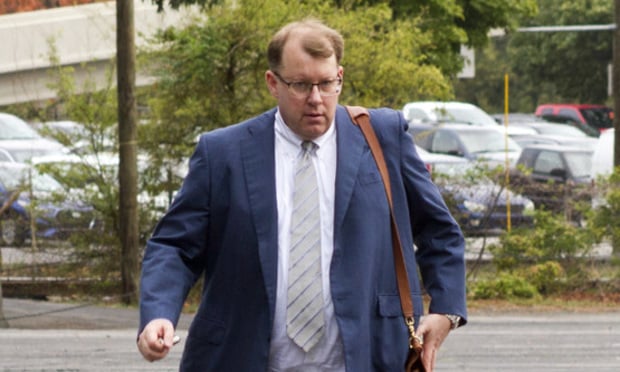Maximum Sentence Sought for Hardwick After Embezzlement Conviction
Atlanta lawyer Nathan Hardwick's sentencing hearing could be as contentious as the trial, according to dueling sentencing arguments.
January 09, 2019 at 04:10 PM
6 minute read
 Nathan Hardwick enters the courthouse in Atlanta on Day Four of testimony in his federal trial on charges of embezzlement. (Photo: John Disney/ALM)
Nathan Hardwick enters the courthouse in Atlanta on Day Four of testimony in his federal trial on charges of embezzlement. (Photo: John Disney/ALM)
Federal prosecutors are seeking a nearly 22-year sentence against Atlanta lawyer Nathan Hardwick IV, whose sentencing hearing for his embezzlement conviction has been pushed to next month to give his defense team more time to prepare.
After 12 days of witness testimony, a federal jury in October convicted Hardwick of embezzling $26 million from his now-bankrupt residential real estate closing firm, Morris Hardwick Schneider.
The sentencing hearing, which had been continued from Dec. 19 to Jan. 10, is now set for Feb. 11 before Judge Eleanor Ross of the U.S. District Court for the Northern District of Georgia. It is shaping up to be as hard-fought as the three-week trial. In the past week, the parties have exchanged sharply worded sentencing memos.
Hardwick's lawyers said in their Jan. 3 memo that Hardwick, 53, should receive only an eight-year sentence. But the government said the next day that an almost 22-year sentence—the maximum under federal guidelines—is warranted.
“Hardwick is a manipulative, deceptive defendant who commits fraud without remorse or regard for his victims. He has no respect for the law and does not believe the rules apply to him,” the government said.
'Lied, Cheated and Stole'
After nine hours of deliberation, 12 jurors rejected Hardwick's defense that the millions of dollars he siphoned out of the firm's escrow and bank accounts to spend on private jets, casinos and women were funds he thought were due to him as the majority owner. They unanimously convicted him on all 21 counts of wire fraud, plus separate counts of conspiracy to commit wire fraud and making false statements to federally insured banks.
Hardwick should receive a stiff, 262-month sentence, said federal prosecutors J. Russell Phillips and Lynsey Barron in their sentencing memo, because the lawyer stole such a large sum—more than $21 million—from Morris Hardwick's bank accounts, including its client trust accounts.
He also perjured himself in his trial testimony and, through his “self-dealing,” caused the firm to “implode,” putting about 800 people out of work, the prosecutors said. Hardwick owned 55 percent of Morris Hardwick, which had been one of the nation's largest residential real estate closing and foreclosure firms before its 2015 bankruptcy.
Besides sentencing enhancements for the large amount of money taken and alleged perjury, the government also is seeking enhancements for the number of victims, Hardwick's role as leader of a criminal activity, abuse of a position of trust and the nature and seriousness of the offenses.
“Hardwick—a lawyer with many years of experience—lied, cheated and stole millions of dollars from his law firm's bank accounts, including accounts established to safeguard client money. His crimes damaged the lives of more than 800 people and potentially could have crippled the residential title insurance industry in the state of Georgia,” the government said.
Hardwick's defense lawyers, Ed Garland, Kristen Novay and Robin Loeb of Garland, Samuel & Loeb, dispute how much money Hardwick received from the firm, arguing that the government has “failed to prove an appropriate loss amount for sentencing.”
In their sentencing memo, the defense said the government's $21.3 million figure appeared to represent the funds that Morris Hardwick's main title insurer, Fidelity National Title, paid into the firm after the account shortfalls were discovered. That amount “is meaningless if it is supposed to represent a loss that was the fault of Mr. Hardwick,” they added.
Hardwick's lawyers said in their extension request that they are still waiting for transcripts of trial testimony from several key witnesses that they need to aid in calculating the loss amount. That will be a key issue at the sentencing hearing, they said, because the size of the loss will be the main factor used to enhance the sentence.
The government did not oppose Hardwick's extension request, which the judge granted Monday.
Perjury at Trial?
In another dispute, the government contends that Hardwick perjured himself at trial by blaming Asha Maurya, his indicted co-conspirator, for the theft of the missing millions. Maurya was the controller for Morris Hardwick's closing operation, which Hardwick ran, during the charged 3.5-year embezzlement period.
Maurya agreed to cooperate with the government before the trial and pleaded guilty to one count of conspiracy to commit wire fraud, but the prosecutors did not call her to testify.
She is scheduled to be sentenced Feb. 12, now the day following Hardwick's own hearing.
The prosecutors said in their memo that Hardwick “categorically denied any and all wrongdoing and tried to place all of the blame on his co-conspirator who had already pled guilty.” They added, “Hardwick made a big show of looking directly at the jury and saying that he had no intent to defraud anyone.”
The defense lawyers said in their extension request that they are waiting for a transcript of Hardwick's trial testimony to contest the government's proposed two-level enhancement for obstruction of justice because of the alleged perjury.
The defense team downplayed Hardwick's wrongdoing.
“Mr. Hardwick certainly failed at managing his own expenses, keeping up with his personal expenditure and distributions and managing the firm financially. And clearly, he also placed trust in the wrong controller, Ms. Maurya,” his lawyers said in the sentencing memo “The jury decided that those failures included withdrawing millions from co-mingled accounts for personal benefit that crossed the line between aggressive business marketing practices and crime.”
Read More:
Hardwick Sentencing Set for December With Millions Still Missing
Hardwick Convicted on All Counts
Hardwick Takes Stand to Defend Against Embezzlement Charges
Hardwick Spent Law Firm's Millions on Jets, Gambling, Girlfriends, Jurors Hear
This content has been archived. It is available through our partners, LexisNexis® and Bloomberg Law.
To view this content, please continue to their sites.
Not a Lexis Subscriber?
Subscribe Now
Not a Bloomberg Law Subscriber?
Subscribe Now
NOT FOR REPRINT
© 2025 ALM Global, LLC, All Rights Reserved. Request academic re-use from www.copyright.com. All other uses, submit a request to [email protected]. For more information visit Asset & Logo Licensing.
You Might Like
View All
Alston & Bird, Eversheds Sutherland Ranked Among Top Firms Globally for M&A Deals in 2024
5 minute read
On The Move: Energy Infrastructure Pro Joins Moore & Van Allen, Adams & Reese Changes Atlanta Leadership
6 minute read

Trending Stories
- 1'Not the President's Personal Lawyer': Lawyers Share Concerns Over How AG Pick Bondi’s Loyalism to Trump May Impact DOJ
- 2US Judge OKs Partial Release of Ex-Special Counsel's Final Report in Election Case
- 3The Demise of Truth and Transparency in Federal Sentencing
- 4Former Phila. Solicitor Sozi Tulante Rejoins Dechert
- 5'I've Seen Terrible Things': Lawyer Predicts Spike in Hazing Suits
Who Got The Work
Michael G. Bongiorno, Andrew Scott Dulberg and Elizabeth E. Driscoll from Wilmer Cutler Pickering Hale and Dorr have stepped in to represent Symbotic Inc., an A.I.-enabled technology platform that focuses on increasing supply chain efficiency, and other defendants in a pending shareholder derivative lawsuit. The case, filed Oct. 2 in Massachusetts District Court by the Brown Law Firm on behalf of Stephen Austen, accuses certain officers and directors of misleading investors in regard to Symbotic's potential for margin growth by failing to disclose that the company was not equipped to timely deploy its systems or manage expenses through project delays. The case, assigned to U.S. District Judge Nathaniel M. Gorton, is 1:24-cv-12522, Austen v. Cohen et al.
Who Got The Work
Edmund Polubinski and Marie Killmond of Davis Polk & Wardwell have entered appearances for data platform software development company MongoDB and other defendants in a pending shareholder derivative lawsuit. The action, filed Oct. 7 in New York Southern District Court by the Brown Law Firm, accuses the company's directors and/or officers of falsely expressing confidence in the company’s restructuring of its sales incentive plan and downplaying the severity of decreases in its upfront commitments. The case is 1:24-cv-07594, Roy v. Ittycheria et al.
Who Got The Work
Amy O. Bruchs and Kurt F. Ellison of Michael Best & Friedrich have entered appearances for Epic Systems Corp. in a pending employment discrimination lawsuit. The suit was filed Sept. 7 in Wisconsin Western District Court by Levine Eisberner LLC and Siri & Glimstad on behalf of a project manager who claims that he was wrongfully terminated after applying for a religious exemption to the defendant's COVID-19 vaccine mandate. The case, assigned to U.S. Magistrate Judge Anita Marie Boor, is 3:24-cv-00630, Secker, Nathan v. Epic Systems Corporation.
Who Got The Work
David X. Sullivan, Thomas J. Finn and Gregory A. Hall from McCarter & English have entered appearances for Sunrun Installation Services in a pending civil rights lawsuit. The complaint was filed Sept. 4 in Connecticut District Court by attorney Robert M. Berke on behalf of former employee George Edward Steins, who was arrested and charged with employing an unregistered home improvement salesperson. The complaint alleges that had Sunrun informed the Connecticut Department of Consumer Protection that the plaintiff's employment had ended in 2017 and that he no longer held Sunrun's home improvement contractor license, he would not have been hit with charges, which were dismissed in May 2024. The case, assigned to U.S. District Judge Jeffrey A. Meyer, is 3:24-cv-01423, Steins v. Sunrun, Inc. et al.
Who Got The Work
Greenberg Traurig shareholder Joshua L. Raskin has entered an appearance for boohoo.com UK Ltd. in a pending patent infringement lawsuit. The suit, filed Sept. 3 in Texas Eastern District Court by Rozier Hardt McDonough on behalf of Alto Dynamics, asserts five patents related to an online shopping platform. The case, assigned to U.S. District Judge Rodney Gilstrap, is 2:24-cv-00719, Alto Dynamics, LLC v. boohoo.com UK Limited.
Featured Firms
Law Offices of Gary Martin Hays & Associates, P.C.
(470) 294-1674
Law Offices of Mark E. Salomone
(857) 444-6468
Smith & Hassler
(713) 739-1250






